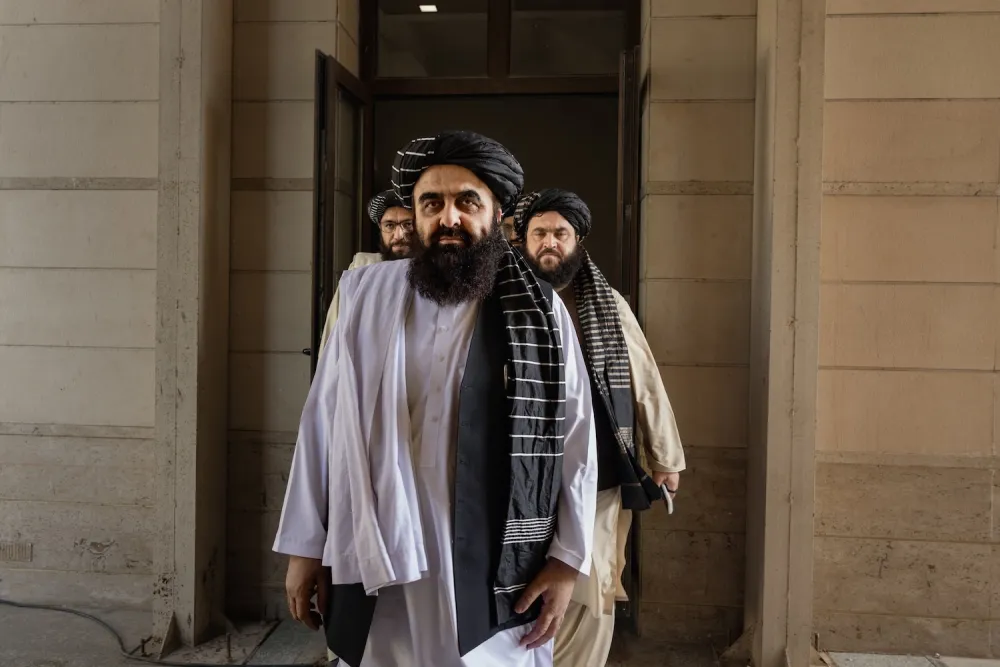Welcome to Foreign Policy’s South Asia Brief.
The highlights this week: Afghan Foreign Minister Amir Khan Muttaqi’s visit to New Delhi reflects a remarkable turnaround in ties, South Asia views the Gaza cease-fire with relief, and clashes intensify along the Afghanistan-Pakistan border.
Why Is India Courting the Taliban?
Afghan Foreign Minister Amir Khan Muttaqi will complete a weeklong visit to India on Thursday. Muttaqi met senior Indian officials, including External Affairs Minister S. Jaishankar; top business leaders; Islamic religious scholars; and members of the Afghan diaspora.
The trip marks the culmination of a remarkable turnaround in ties between India and the Taliban, which for decades had a hostile relationship. New Delhi backed anti-Taliban factions in the 1990s and worked closely with other Afghan governments during the U.S.-led war in Afghanistan. India has also blamed the group for several attacks on Indian targets in Afghanistan.
India began to signal a new willingness to engage after the Taliban returned to power in 2021. New Delhi partially reopened its embassy in Kabul the next year, and it has recently permitted Taliban officials to take over Afghan consulates in Mumbai and Hyderabad.
Meanwhile, diplomacy has picked up. In January, Indian Foreign Secretary Vikram Misri met Muttaqi in Dubai, and Jaishankar spoke to him by phone in May. This shift in bilateral ties is rooted in a genuine mutual interest to make the relationship work. But constraints on the Indian side mean that the partnership’s potential should not be overstated.
For India, engaging with the Taliban facilitates its ability to pursue core interests in Afghanistan, including building on its legacy as a longtime provider of humanitarian and development aid. Indian officials also value Afghanistan as a gateway to Central Asia, where New Delhi wants to increase access.
Most importantly, India worries about security risks in Afghanistan—especially the presence of terrorist groups that could target Indian citizens and interests. A key outcome of Muttaqi’s visit this week was New Delhi’s decision to fully reopen its embassy in Kabul—a move that will better enable it to track threats.
The recent deterioration in the Taliban regime’s ties with onetime ally Pakistan gives India a stronger motivation to move closer to Afghanistan. It provides Indian officials more diplomatic space to engage with the Taliban as well as an opportunity to gain a strategic advantage in a country that has long been a battleground for India-Pakistan competition.
Fortunately for India, outreach to the Taliban amounts to pushing on an open door. The regime welcomes Indian aid and the international legitimacy that comes with engagement. The Taliban have domestic political imperatives, and the Afghan public has long viewed New Delhi as a friend. Finally, the alliance with Pakistan lost some of its utility at the end of the war, and the group has less to lose by pushing closer to India.
There will still be limits to ties. India doesn’t let values-based considerations drive its foreign policy, but the Taliban’s draconian approach, especially toward women and girls, will be a constraint.
In New Delhi, Muttaqi held a press conference at the Afghan Embassy, where women reporters were barred from attending. This provoked outcry from Indian journalists and others, including the political opposition; Muttaqi ultimately held a separate press conference a few days later that women were allowed to attend. Likewise, a stronger embrace of the Taliban could have considerable political costs for Indian officials.
India will also want more assurances about the Taliban’s commitment to addressing terrorism concerns—particularly groups such as Lashkar-e-Taiba and Jaish-e-Mohammed, traditional Taliban allies that were long sponsored by Pakistan. (The Taliban have tended to focus on their rival, the Islamic State-Khorasan.)
A week is a long time to host a senior foreign official—especially one whose government has yet to receive formal recognition. India clearly wants to send a message to the Taliban to indicate how serious it is about patching up ties. But like other relationships in South Asia that have taken unexpectedly positive turns, this one will face limitations that could spoil the optimism.
What We’re Following
What Gaza peace means for South Asia. This week’s encouraging news from the Middle East, from Israel-Hamas hostage and prisoner releases to the peace summit in Egypt, will be viewed with relief in many South Asian capitals—which are best served by stability in the region.
Many South Asian countries depend heavily on imports, especially energy, from the Middle East. There are also large numbers of South Asian expatriates there, especially in the Gulf region, including nearly 9 million Indians; their remittances are critical for their home countries’ economies.
A definitive end to the war in Gaza, however, could present a policy challenge for Pakistan, which will likely face pressure from the United States to sign the Abraham Accords—especially if Saudi Arabia commits. Islamabad is keen to deepen partnership with Washington and Riyadh but has long ruled out normalizing ties with Israel until there is a Palestinian state.
Breaking that vow could cause considerable domestic political damage for Pakistan’s government, angering much of the public and hard-line Islamist parties.
Afghanistan-Pakistan border heats up. Last weekend brought some of the most intense clashes along the Afghanistan-Pakistan border in recent years, beginning after Pakistan launched particularly intense airstrikes in Afghan territory against terrorist targets, including in Kabul. Pakistan has long carried out limited cross-border counterterrorism operations.
The Taliban retaliated by attacking Pakistani border posts, prompting another round of strikes from Pakistan. According to the Pakistani military, 23 of its soldiers and 200 Taliban soldiers and affiliated militants were killed in the weekend violence. Hostilities then slowed, but Pakistan said it launched “precision strikes” in Kandahar and Kabul on Tuesday.
Pakistan’s foreign office announced a 48-hour cease-fire starting on Wednesday.
Islamabad’s ties with Kabul have been deeply strained since the Taliban returned to power in 2021, mainly because the Taliban have refused to curb the presence of the Tehreek-e-Taliban Pakistan (TTP), which operates from bases in Afghanistan and has dramatically ramped up attacks on Pakistani security forces. (The Taliban are opposed to turning on close militant allies.)
Other Pakistani tactics—holding talks with the TTP, putting pressure on the Taliban, and more limited kinetic activities—have failed to address the problem. But unfortunately for Pakistan, there is no indication that the TTP’s capacity has been degraded—and Islamabad has less leverage over the Taliban now than during Afghanistan’s war years.
Modi, Starmer hail new trade deal. British Prime Minister Keir Starmer met Indian Prime Minister Narendra Modi in Mumbai last week to discuss a trade deal finalized in July. The agreement lowers tariffs on a range of goods and aims to boost trade by $34 billion by 2040. Starmer said that trade and investment have already grown by a remarkable $8 billion in three months.
Starmer clearly wanted to send a strong message during his visit: He was accompanied by a delegation of 100 business, academic, and cultural leaders. There are plenty of reasons for the United Kingdom to boost cooperation with India, the world’s fastest-growing major economy. But the deal is very important for New Delhi as well.
Hit by high U.S. tariffs, India is keen to find new sources of market access and limit economic damage. The U.K. deal, coupled with a free trade agreement with the European Union that is likely to be finalized by year’s end, can help move the needle forward. So can India’s slow but steady detente with China.
Under the Radar
On Monday, Pakistani police cleared a large protest in the town of Muridke, near Lahore; five people, including a policeman, were killed. Few details of the operation were made public, though demonstrators said law enforcement fired live bullets and tear gas. Police said the demonstration had quickly turned violent.
The protest, led by hard-line Islamist party Tehreek-e-Labbaik Pakistan (TLP), focused on condemning Israel and expressing solidarity with Gaza. It began in Lahore and was expected to continue to Islamabad, with plans to congregate outside the U.S. Embassy. Local authorities tried to convince TLP to halt the protests, but negotiations broke down.
TLP boasts large mobilization power and draws support from its aggressive backing of Pakistan’s blasphemy laws, which criminalize behavior that insults Islam and are often exploited by extremists. Because of TLP’s influence and tendency toward violence, Pakistani officials often respond to its protests with talks and appeasement instead of the use of force.
This makes Monday’s decision to crack down striking, and the reason likely had to do with the protest’s cause.
Pakistan doesn’t have formal ties with Israel—and most of the country would side with any campaign that expresses solidarity with Gaza. But Islamabad is trying hard to cultivate support from Washington and is likely uncomfortable with large public expressions of anti-Israel sentiment, especially if they manifested outside the U.S. Embassy.
There have been other anti-Israel protests in Pakistan in recent months. But the TLP is a fearsome group, and this protest came at an especially sensitive time as the Gaza cease-fire took effect and U.S. President Donald Trump visited Israel and Egypt for peace talks.
FP’s Most Read This Week
- One Question Looming Over the Gaza Deal: Why Now? by Daniel Byman
- Russia’s Next Opposition Will Not Be Liberal by Alexey Kovalev
- Trump’s Nobel Peace Prize Obsession Isn’t Over by James Crabtree
Regional Voices
In the Economic Times, analysts Dhanendra Kumar and Pranjal Prateek argue that India must get innovation right to benefit from artificial intelligence. “The challenge is not just to innovate but to innovate fairly. With the right checks and balances, India can lead the world in building an AI economy that works for everyone,” they write.
In the Kathmandu Post, researcher Pratyoush Onta highlights that Nepali academics are producing more research than before. “Unlike 25 years ago, academics in many parts of the country, including those based in small towns, are engaging in some form of research and research-related writings,” he writes.
A Kuensel editorial laments Bhutan’s lack of food self-sufficiency: “Our ancestors understood something we risk forgetting—that food is sovereignty. A nation that cannot feed itself cannot truly stand independent,” it argues. “What is missing is our collective will to treat agriculture not as a nostalgic ideal but as the foundation of our future.”
The post Taliban Foreign Minister Spends the Week in India appeared first on Foreign Policy.




